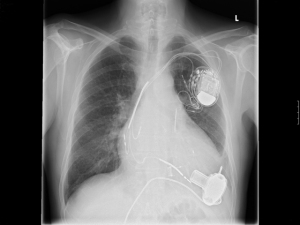Pacemaker and ICD battery life needs to be extended to last 25 years
by
Lauren Dubinsky, Senior Reporter | February 05, 2016

The battery life of implantable cardioverter defibrillators (ICD) and pacemakers needs to be extended to last 25 years or more in order to reduce the need for replacement and the associated risks, according to an article published yesterday in The BMJ.
Once a pacemaker is implanted, the battery is expected to last between five and 10 years, according to Mayo Clinic. Due to that limited battery life, more than half of patients will require new batteries and between 11 and 16 percent will need multiple replacements, which can lead to life-threatening infections.
The situation is even worse for patients with ICDs — the risks of infection during the implant procedure and device replacement are higher than with pacemakers, and the batteries only last between four to seven years on average. In addition, since there is no standard definition, infection rates vary widely and the assumed risk of .5 percent for new implants and 1 to 5 percent for replacement procedures might be incorrect, according to the article.
"Every invasive pacemaker procedure exposes the patient to a risk of complications, so it is important to minimize the number of surgical interventions if at all possible," Dr. John Dean, one of the authors of the article and consultant cardiologist at Royal Devon and Exeter Hospital, told HCB News. "The major way of achieving this is with longer-life batteries."
Dean and Dr. Neil Sulke, the other author and consultant cardiologist at Eastbourne Hospital, are calling for engineers to redesign the existing technology and develop pacemakers that will not require new batteries as frequently.
But many hurdles stand in the way — the current financial model doesn't support the development of devices with longer lives and it's assumed that patients prefer smaller devices, even though a 2004 study published in the journal Pacing and Clinical Electrophysiology found that 90 percent actually prefer larger devices if they last longer.
"Although some manufacturers have invested in battery technology to improve the longevity, this has not resulted in any significant growth in sales," said Dean. "Battery life does not appear to be a major selling point."
While the cardiologists did caution that early replacement might be necessary for patients at high risk of cardiac issues, allowing batteries to deplete for longer before replacing them in low-risk patients may safely extend the time before another invasive procedure. When a pacemaker reaches what is called, "elective replacement indication" it's usually three to 12 months before it will reach the end of its life and even then, the battery might continue to function for another several months.
ICDs are usually replaced when they are still able to deliver at least six full energy shocks, which means the devices that cost up to £25,000 are being discarded when they could last at least another six months.
Dean and Sulke are urging engineers to design pacemakers that last for more than 25 years with an increase in volume of the device of about 40 percent. In the future, greater developments in battery technology might enable smaller or rechargeable devices.
"There is an urgent need to minimize the requirement for replacement of these devices," they wrote. "Doing so will save lives, minimize suffering, and reduce costs."
|
|
|
You Must Be Logged In To Post A Comment
|
